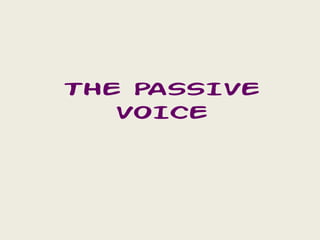
The passive voice
- 2. • La voz pasiva se forma con el verbo auxiliar “to be” y el participio del verbo activo • Active voice; He eats an apple • Passive voice: An apple is eaten by him
- 3. • Para transformar una frase de activa a pasiva tenemos en cuenta los siguientes pasos: 1. El objeto de la oración activa pasa a ser sujeto de la oración pasiva 2. El verbo principal se sustituye por el auxiliar “to be” y debe ir en el mismo tiempo. 3. El verbo principal se pone en participio. 4. El sujeto de la oración activa pasa a ser el complemento agente y en inglés va introducido por la preposición by
- 4. • EJEMPLOS Dickens wrote this book This book was written by Dickens • El verbo “wrote” está en pasado por lo tanto pondremos el auxuiliar “be” en pasado • El verbo “wrote” en participio
- 5. USOS • Usamos la voz pasiva cuando no sabemos quien ha hecho la acción: Someone stole the car The car was stolen • Usamos la voz pasiva caundo queremos dar más importancia a la acción y no nos interesa saber quien la hizo The letter was delivered yesterday A mistake was made
- 6. • A diferencia del catalán y el castellano, en inglés si una oración activa tiene complemento directo y complemento indirecto, cualquiera de los dos puede ser el sujeto de la oración pasiva. • They gave her a present • She was given a present • A present was given to her
- 7. • La oración pasiva de objeto indirecto se usa cuando queremos destacar el objeto indirecto y no el directo. • Ejemplos típicos de verbos con dos objetos: ask give offer order pay sell send show tell
- 8. Nosotros veremos este curso la oraciones pasivas en presente simple y en pasado simple PRESENTE SIMPLE • A book is bought • Two books are bought • The book isn’t bought • Is the book bought? SIMPLE PAST • A book was bought • Two books were bought • The book wan’t bought • Was the book bought?
- 9. Más ejemplos • He loves her – She is loved (by him) • El la ama - Ella es amada por él • They sing the songs – The song are sung • Ellos cantan las caciones - Las canciones son cantadas • He killed them – They were killed • El los asesinó – Ellos fueron asesinados